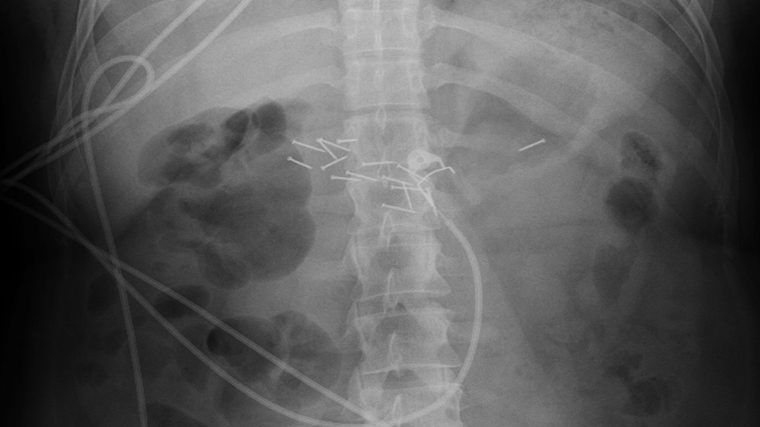Monday Poster Session
Category: General Endoscopy
P3029 - A Case of Recurrent Intentional Thumbtack Ingestion in a Patient With Tourette Syndrome and Mood Disorder: A Multidisciplinary Dilemma
Monday, October 27, 2025
10:30 AM - 4:00 PM PDT
Location: Exhibit Hall

Wael T. Mohamed, MD (he/him/his)
University of Kansas School of Medicine
Wichita, KS
Presenting Author(s)
Wael T. Mohamed, MD1, William J.. Salyers, MD, MPH2, Nathan Tofteland, MD1, Kyle Rowe, MD1
1University of Kansas School of Medicine, Wichita, KS; 2University of Kansas School of Medicine - Wichita, Wichita, KS
Introduction: Intentional foreign body ingestion is a rare but significant challenge, often associated with psychiatric comorbidities. Ingestion of sharp objects like thumbtacks poses serious risk of perforation, bleeding, and surgical intervention. Management requires coordinated care between gastroenterology, psychiatry, and primary teams, especially when repeated ingestion events occur.
Case Description/
Methods: A 33-year-old female with Tourette syndrome, bipolar disorder, OCD, and recurrent episodes of thumbtack ingestion presented twice within a short interval after ingesting 10 and 16 thumbtacks, respectively. She cited frustration with her living situation and denied active suicidal ideation. On both occasions, imaging confirmed radiopaque objects clustered in the LUQ. Emergent EGD was performed. Initially, 10 thumbtacks were retrieved using a hex snare and overtube; subsequent EGD retrieved 11 thumbtacks, while others had migrated distally and were unreachable. Serial abdominal imaging confirmed distal passage of retained thumbtacks. The patient remained hemodynamically stable, was treated with IV pantoprazole, and was monitored for mucosal injury and perforation.
Despite the severity of ingestion, the patient consistently denied suicidal intent and expressed regret. Psychiatry recommended outpatient follow-up, though concerns were raised regarding the risk of repeat behavior. The patient was discharged after multidisciplinary discussion with GI, psychiatry, and hospital medicine teams.
Discussion: This case highlights the recurrent nature and management complexity of intentional sharp object ingestion in patients with underlying psychiatric disorders. While endoscopic retrieval is effective, it is not risk-free. Discharge decisions must balance psychiatric stability with the unpredictable risk of recurrence. Interdisciplinary coordination is vital, particularly when outpatient psychiatric resources are limited or when patients refuse inpatient care.
Recurrent sharp object ingestion presents both a clinical and ethical challenge. A unified approach integrating gastroenterology, psychiatry, and social services is essential for optimizing outcomes and reducing the risk of future harm.

Figure: Radiopaque shadows of thumbtacks.

Figure: Successful endoscopic retrieval of foreign bodies.
Disclosures:
Wael Mohamed indicated no relevant financial relationships.
William Salyers indicated no relevant financial relationships.
Nathan Tofteland indicated no relevant financial relationships.
Kyle Rowe indicated no relevant financial relationships.
Wael T. Mohamed, MD1, William J.. Salyers, MD, MPH2, Nathan Tofteland, MD1, Kyle Rowe, MD1. P3029 - A Case of Recurrent Intentional Thumbtack Ingestion in a Patient With Tourette Syndrome and Mood Disorder: A Multidisciplinary Dilemma, ACG 2025 Annual Scientific Meeting Abstracts. Phoenix, AZ: American College of Gastroenterology.
1University of Kansas School of Medicine, Wichita, KS; 2University of Kansas School of Medicine - Wichita, Wichita, KS
Introduction: Intentional foreign body ingestion is a rare but significant challenge, often associated with psychiatric comorbidities. Ingestion of sharp objects like thumbtacks poses serious risk of perforation, bleeding, and surgical intervention. Management requires coordinated care between gastroenterology, psychiatry, and primary teams, especially when repeated ingestion events occur.
Case Description/
Methods: A 33-year-old female with Tourette syndrome, bipolar disorder, OCD, and recurrent episodes of thumbtack ingestion presented twice within a short interval after ingesting 10 and 16 thumbtacks, respectively. She cited frustration with her living situation and denied active suicidal ideation. On both occasions, imaging confirmed radiopaque objects clustered in the LUQ. Emergent EGD was performed. Initially, 10 thumbtacks were retrieved using a hex snare and overtube; subsequent EGD retrieved 11 thumbtacks, while others had migrated distally and were unreachable. Serial abdominal imaging confirmed distal passage of retained thumbtacks. The patient remained hemodynamically stable, was treated with IV pantoprazole, and was monitored for mucosal injury and perforation.
Despite the severity of ingestion, the patient consistently denied suicidal intent and expressed regret. Psychiatry recommended outpatient follow-up, though concerns were raised regarding the risk of repeat behavior. The patient was discharged after multidisciplinary discussion with GI, psychiatry, and hospital medicine teams.
Discussion: This case highlights the recurrent nature and management complexity of intentional sharp object ingestion in patients with underlying psychiatric disorders. While endoscopic retrieval is effective, it is not risk-free. Discharge decisions must balance psychiatric stability with the unpredictable risk of recurrence. Interdisciplinary coordination is vital, particularly when outpatient psychiatric resources are limited or when patients refuse inpatient care.
Recurrent sharp object ingestion presents both a clinical and ethical challenge. A unified approach integrating gastroenterology, psychiatry, and social services is essential for optimizing outcomes and reducing the risk of future harm.

Figure: Radiopaque shadows of thumbtacks.

Figure: Successful endoscopic retrieval of foreign bodies.
Disclosures:
Wael Mohamed indicated no relevant financial relationships.
William Salyers indicated no relevant financial relationships.
Nathan Tofteland indicated no relevant financial relationships.
Kyle Rowe indicated no relevant financial relationships.
Wael T. Mohamed, MD1, William J.. Salyers, MD, MPH2, Nathan Tofteland, MD1, Kyle Rowe, MD1. P3029 - A Case of Recurrent Intentional Thumbtack Ingestion in a Patient With Tourette Syndrome and Mood Disorder: A Multidisciplinary Dilemma, ACG 2025 Annual Scientific Meeting Abstracts. Phoenix, AZ: American College of Gastroenterology.
